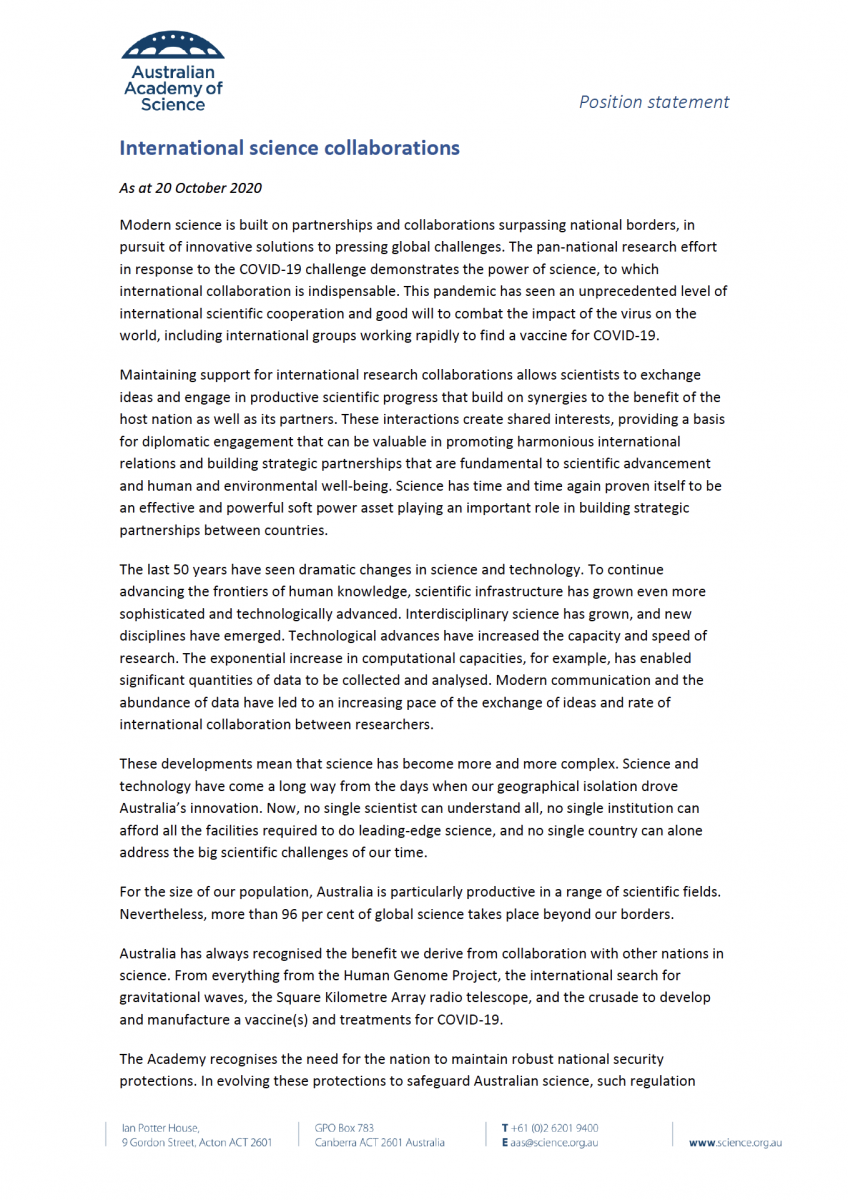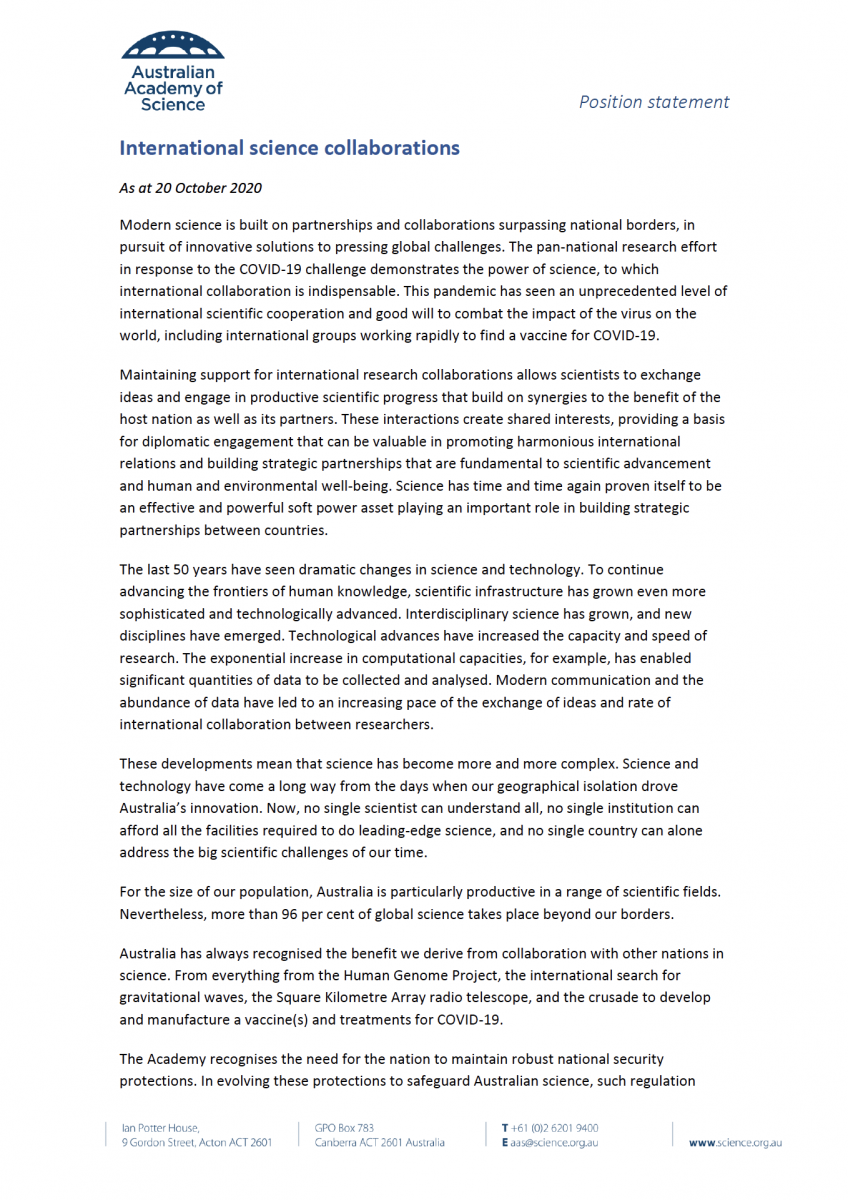Position statement – Freedom and responsibility of science

Purpose
This position statement consolidates the Academy’s three previous statements on freedoms of scientists and is updated to reflect the International Science Council (ISC)’s Principle of Freedom and Responsibility in Science.
Statement of principle
The right to share in and benefit from scientific advancement is enshrined in the Universal Declaration of Human Rights, as is the right to engage in scientific enquiry, to communicate knowledge, and to associate freely in such activities.
With these rights comes responsibilities, both for scientists and the society within which they work.
Scientists and scientific organisations have a responsibility to conduct their scientific work to agreed ethical standards, with integrity, respect, fairness, transparency, and trustworthiness, and to consider the implications of new knowledge for society.
The Academy defends the important and respected role of scientists in society in developing and promoting independent, evidence-based advice.
Policymakers, acting on behalf of the community they serve, have a responsibility to listen to expertise and to make reasoned, evidence-based judgements drawing on science as appropriate.
Policymakers and scientists also set boundaries around the scientific endeavour, which properly reflect the expectations of the community. These boundaries must balance the benefits of scientific practice with its risks and costs. They should not stifle imagination and progress but encourage growth and accessibility for the maximum possible benefit.
The Academy’s position
The Academy supports the ISC’s 'Principle of freedom and responsibility in science' (Article 7):
The free and responsible practice of science is fundamental to scientific advancement and human and environmental well-being. Such practice, in all its aspects, requires freedom of movement, association, expression and communication for scientists, as well as equitable access to data, information and other resources for research. It requires responsibility at all levels to carry out and communicate scientific work with integrity, respect, fairness, trustworthiness, and transparency, recognizing its benefits and possible harms.
In advocating the free and responsible practice of science, the Council promotes equitable opportunities for access to science and its benefits, and opposes discrimination based on such factors as ethnic origin, religion, citizenship, language, political or other opinion, sex, gender identity, sexual orientation, disability or age.
Science and society
The Academy recognises that science is not practised in a vacuum. Science is practised within society by members of society, and society sets the rules for what is acceptable and what is not.
Society’s expectations, standards, and moral judgements set the boundaries of the science that is practised in its name. Science’s continued acceptance – the ‘social licence’ – requires transparency and accountability from the scientific research community, in return for society’s confidence and ultimately their support.
The requirements for maintaining the social licence are not static. As new knowledge emerges, society’s expectations, standards and moral judgements change. The practices of scientists also change to reflect these new expectations, standards and judgements.
Securing an appropriate balance between the freedoms and limits of science includes reasonable regulations and constraints placed on scientists. For instance, there are controls on animal and human experimentation, regulation of gene technologies and radiochemicals, and restrictions on issues of national security.
We must be sensitive to the inherent risks of scientific research, but also the risks of over-regulation. Undue restriction on science carries significant opportunity costs in unrealised scientific benefits. Getting the balance right is critical; getting it wrong could be disastrous.
Freedom and responsibility of science
The Academy holds that the interests of the community and the advancement of knowledge are best served when scientists respect the social licence and can go about their work, move, collaborate, put forward views, and present data for discussion and scrutiny without undue interference.
The Australian and international community expects that science agencies, institutions, businesses, and individuals apply the highest ethical and professional standards to their work and conduct.
The Academy endorses the Australian code for the responsible conduct of research, the key principles of which are: honesty, rigour, transparency, fairness, respect, recognition of the rights of Aboriginal and Torres Strait Islander peoples, accountability and promotion of responsible research practices.
The Academy also supports the Singapore statement on research integrity, developed as part of the 2nd World Conference on Research Integrity (2010), which is a global guide to the responsible conduct of research and includes principles of honesty, accountability, professional courtesy and fairness, and good stewardship of research.
Statement of authorisation
This statement was endorsed by the Academy’s Council on 16 August 2023.
This position statement supersedes the following statements:
- Scientists’ freedom to work (2011)
- Protection of scientists from violence and intimidation (2016)
- Scientists' freedom of movement (2017)







